Proprioceptive Writing became part of my life in Japan in 2005. Having started classes that included right-brain exercises to trick students into opening up creatively when they thought they could not, felt blocked or quite the opposite, overwhelmed emotionally, I searched for a technique that I could incorporate into classes to help place this journey safely in their own hands, literally.

WRITING THE MIND ALIVE- The Proprioceptive Method for Finding Your Authentic Voice, is available online: https://www.amazon.co.uk/Writing-Alive-Linda-Trichter-Metcalf/dp/0345438582
Finding the book Writing the Mind Alive proved miraculous, and it has been a part of my writing programme, Drawing on the Writer Within, ever since. Every class concludes with a WRITE, and here in Scotland I also offer a PW session locally on the first Saturday of the month.
A WRITE is the piece of meditative writing produced in 25 minutes, to Baroque music and in candlelight, and which uses the question What do I mean by… to dig ever deeper into the words being written on the page.
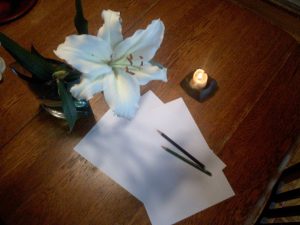
A candle, for illumination (because it’s the loveliest meditative light), three sheets of plain paper, and something to write with; most use pencil. Baroque music is the same beat as the human heart, so helps calm and let go…If you become unaware of it, you can be said to be in the zone…
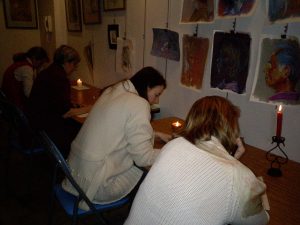
Introducing PW: one of the earliest courses at RBR (Right Brain Research) in central Tokyo in 2005…
PW (as called for short) dates from the 1970s, and is going stronger than ever in the USA, where it is based at The Proprioceptive Writing Center, 1001 53rd Street, Oakland, CA 94608), but taught and facilitated all over the USA.
Some students find PW too personally intrusive and resist. Some can get angry, aggressive even, flounce out of the room, cast blame… The large majority, however, acknowledge that it helps towards authenticity, increased self-awareness, happiness and success. And a few take to it like ducks to water, making the practice part of their every day. I remember Helen in Tokyo, for example, doing several hundred.

Brendon, who learned PW as part of the two-day first-level DOTWW course he did in Zushi, in 2010. He now lives in Ireland.
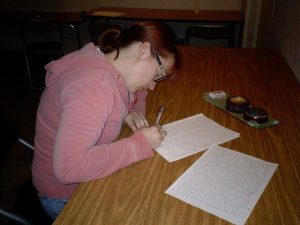
Lauren, who went on to do all four 8-class courses of DOTWW and has at the very least, 32 WRITES to her name. She still lives in Tokyo.
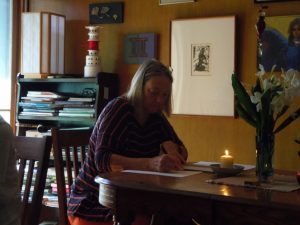
Heera, at work on our dining table at what I thought to be the last PW workshop in Japan; it was in Zushi in autumn 2012… She is now returned to Cumbria in the UK.
As for Gordon, here in Scotland, he just passed the 500 mark.
Gordon grew up in Glasgow, where he learned three survival techniques: Learn to fight; learn to climb a tree; and learn to light a fire so you can, in retaliatory fashion, burn down someone’s house. (He laughs at this, but back then it was not funny. The area where he grew up was as tough as they come.)
At our last PW session – he was one of two who travelled a fair distance and braved ice and snow – Gordon had done 461 WRITES, and has them now sitting in piles around his flat under headings like Family, Career, Recreation, Spirituality, Health and Happiness.

The first PW session in Clunie Hall after our move to Scotland in late 2012. Those who came had mostly completed level one of DOTWW over eight weeks at the Birnam Arts Institute in early 2013. Others were simply curious.
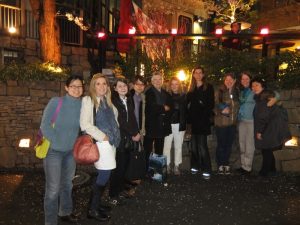
After a PW workshop in Tokyo, 2014, organised by graduate DOTWW students: L to R: Robyn, Efrot, Kathryn, Etsuko, Angela, Jacinta, Petya, Ruthie, Sarah and Yumiko.
“And your father?” I asked, remembering this particular difficulty. (His father had died when he was ten.)
“Done. Finished. I remember you saying that at some point we would get bored of writing the same old stuff, and simply accept that journeys are different. He had his. I have mine. )
WRITES are now part of Gordon’s daily routine. He gets up at 6.30 every morning and nowadays spends 45 minutes at the kitchen table. He still starts with three sheets of paper, but does now often reach for more. He has worn out three CDs of music, and burned any number of candles. But it’s not an addiction, he says.
It’s a ritual that takes him into a quiet place, from where his WRITE flows. He goes so quickly and easily into the zone of listening instead of thinking these days that he doesn’t even hear the music. But he knows it’s doing its job.
“I look back and can see clearly how the last 18 months have transformed my life. PW is now simply a part of each and every day.”

Gordon and Marion on February 2, 2018, after their PW session. All the snow had gone, melted perhaps by happy smiles in tandem with winter sunshine? Asked why she comes on a regular basis, Marion replied: “Because I always learn something new about myself.”
He moved town, has a new home, and work is blossoming. A good part of his week is now spent taking plants into care homes for the residents to nurture and enjoy. He also accompanies dementia patients into woodland and forest. Families report they come back so much happier, so much calmer.
For myself, nowadays, PW is the practice I turn to when disturbed or lack clarity. When I first read Writing the Mind Alive, I found it totally inspiring. While not an officially accredited teacher of PW, I know Linda and Toby have always been aware I am using their teachings. Indeed I did an online course with Toby from Japan quite early on to make sure I was on the right track. While not believing any methodology of doing anything is set in stone, I have never deviated from the prescribed elements of ritual. Why? Because they work.
Of course, as I wrote at the beginning, no practice works for everyone. It can only work with people on their different levels of need and understanding in any particular timeline. But on a basic level, as psychotherapist Susan Gutwill wrote in her praise of the book when first published in 2002: “Proprioceptive Writing has helped me write, think, feel and most important, live more fully in the world and in myself.”

